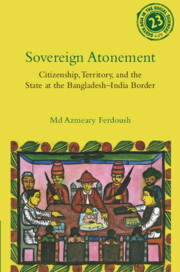Book contents
- Frontmatter
- Contents
- List of figures
- Preface
- Acknowledgments
- Introduction: Remnants, nations, and the sovereign
- 1 Sovereign atonement
- 2 From “sensitive” to “symbolic” spaces
- 3 Land and citizenship as technologies of territory
- 4 Everyday governance: Ambiguity, accountability, and abundance
- 5 Infrastructure, belonging, and the state
- 6 Refusal and tolerance
- Epilogue
- Appendix: A note on methods
- References
- Index
4 - Everyday governance: Ambiguity, accountability, and abundance
Published online by Cambridge University Press: 30 April 2024
- Frontmatter
- Contents
- List of figures
- Preface
- Acknowledgments
- Introduction: Remnants, nations, and the sovereign
- 1 Sovereign atonement
- 2 From “sensitive” to “symbolic” spaces
- 3 Land and citizenship as technologies of territory
- 4 Everyday governance: Ambiguity, accountability, and abundance
- 5 Infrastructure, belonging, and the state
- 6 Refusal and tolerance
- Epilogue
- Appendix: A note on methods
- References
- Index
Summary
One of the most powerful and popular narratives among a range of actors, including state officials, politicians, journalists, and former enclave residents, was that “the state was absent” in the enclaves and that they were therefore spaces where no rules applied. The exchange and the merger of the enclaves heightened the spirit of the residents, as these enabled the state to “enter” these spaces. As the state “entered” these spaces, part of the excitement the former enclave residents shared also concerned the everyday “sightings of the state” – that is, to be able to experience the presence of the state in their mundane lives and interact with it (Corbridge et al., 2005, p. 9). For the Bangladeshi state, entering these spaces meant bringing the once “anarchic” spaces under its rules of governance and thus to pacify – to borrow from Stuart Corbridge, Glyn Williams, Manoj Srivastava, and René Véron – the “scarcity of the state” in these spaces (Corbridge et al., 2005, p. 33). As part of my quest to unearth the “everyday local state” (Pill and Guarneros-Meza, 2020) in the former enclaves, I was therefore interested in exploring both how state sighting happened in the enclaves and, by extension, how the state of Bangladesh dealt with its “scarcity” – how the state asserted its presence in the enclaves.
However, as I embarked on this journey, it quickly became apparent that I needed to first decide how to “capture” the state in this particular context. Was it the abstract idea of an all-encompassing entity that now claimed sovereign control over these spaces? Was it the amalgamation of all the laws and rules that were now being applied to these people and spaces? Was it the formal jurisdiction of state officials and the state offices in their daily lives? Was it the daily faceoff between the enclave residents and the state officials? Was it all of these, some of these, or none of these? These questions are not new but keep challenging those who study the state. I was no exception.
In his classical study on the difficulties of reading the state, Philip Abrams contends that the state itself is the mask that prevents us from digging more deeply into its actions as they are (Abrams, 1988). Instead of decoding the abstract idea of a “state,” Abrams therefore calls for a deeper analysis of the “systems” that bring a state into being.
- Type
- Chapter
- Information
- Sovereign AtonementCitizenship, Territory, and the State at the Bangladesh-India Border, pp. 88 - 110Publisher: Cambridge University PressPrint publication year: 2024

